YorkTalks is our annual research event celebrating our incredible research community here at York.
This year, YorkTalks will have a new, more flexible and interactive format that can truly showcase York’s research at its best. The first revised edition of York Talks will be focused on heritage research at York.
To mark the new format, we are collaborating with York’s Festival of Ideas this year, meaning that the event will take place in June 2026.
Talking with and about our incredible research community at York is at the heart of what YorkTalks is all about, and we look forward to sharing more details with you as the programme evolves.


.jpg)